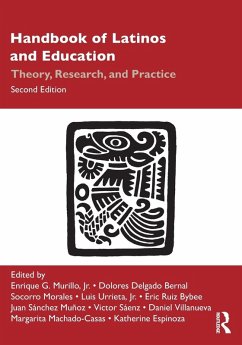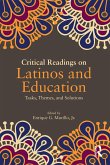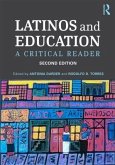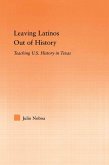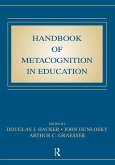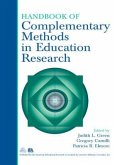Handbook of Latinos and Education
Theory, Research, and Practice
Herausgeber: Murillo, Jr Enrique G.; Morales, Socorro; Delgado Bernal, Dolores
Handbook of Latinos and Education
Theory, Research, and Practice
Herausgeber: Murillo, Jr Enrique G.; Morales, Socorro; Delgado Bernal, Dolores
- Broschiertes Buch
- Merkliste
- Auf die Merkliste
- Bewerten Bewerten
- Teilen
- Produkt teilen
- Produkterinnerung
- Produkterinnerung
Now in its second edition, this Handbook offers a comprehensive review of rigorous, innovative, and critical scholarship profiling the scope and terrain of academic inquiry on Latinos and education. Presenting the most significant and potentially influential work in the field in terms of its contributions to research, to professional practice, and to the emergence of related interdisciplinary studies and theory, the volume is now organized around four tighter key themes of history, theory, and methodology; policies and politics; language and culture; teaching and learning. New chapters broaden…mehr
Andere Kunden interessierten sich auch für
![Critical Readings on Latinos and Education Critical Readings on Latinos and Education]() Critical Readings on Latinos and Education75,99 €
Critical Readings on Latinos and Education75,99 €![Latinos and Education Latinos and Education]() Latinos and Education110,99 €
Latinos and Education110,99 €![Leaving Latinos Out of History Leaving Latinos Out of History]() Julio NoboaLeaving Latinos Out of History80,99 €
Julio NoboaLeaving Latinos Out of History80,99 €![Handbook of Metacognition in Education Handbook of Metacognition in Education]() John Dunlosky / Arthur C. Graesser / Douglas J. Hacker (eds.)Handbook of Metacognition in Education153,99 €
John Dunlosky / Arthur C. Graesser / Douglas J. Hacker (eds.)Handbook of Metacognition in Education153,99 €![The Routledge International Handbook of Higher Education The Routledge International Handbook of Higher Education]() The Routledge International Handbook of Higher Education72,99 €
The Routledge International Handbook of Higher Education72,99 €![Handbook of Early Childhood Teacher Education Handbook of Early Childhood Teacher Education]() Handbook of Early Childhood Teacher Education164,99 €
Handbook of Early Childhood Teacher Education164,99 €![Handbook of Complementary Methods in Education Research Handbook of Complementary Methods in Education Research]() Handbook of Complementary Methods in Education Research185,99 €
Handbook of Complementary Methods in Education Research185,99 €-
-
-
Now in its second edition, this Handbook offers a comprehensive review of rigorous, innovative, and critical scholarship profiling the scope and terrain of academic inquiry on Latinos and education. Presenting the most significant and potentially influential work in the field in terms of its contributions to research, to professional practice, and to the emergence of related interdisciplinary studies and theory, the volume is now organized around four tighter key themes of history, theory, and methodology; policies and politics; language and culture; teaching and learning. New chapters broaden the scope of theoretical lenses to include intersectionality, as well as coverage of dual language education, discussion around the Latinx, and other recent updates to the field. The Handbook of Latinos and Education is a must-have resource for educational researchers; graduate students; teacher educators; and the broad spectrum of individuals, groups, agencies, organizations, and institutions that share a common interest in and commitment to the educational issues that impact Latinos.
Hinweis: Dieser Artikel kann nur an eine deutsche Lieferadresse ausgeliefert werden.
Hinweis: Dieser Artikel kann nur an eine deutsche Lieferadresse ausgeliefert werden.
Produktdetails
- Produktdetails
- Verlag: Routledge
- 2. Auflage
- Seitenzahl: 454
- Erscheinungstermin: 30. Juli 2021
- Englisch
- Abmessung: 254mm x 178mm x 24mm
- Gewicht: 848g
- ISBN-13: 9780367262136
- ISBN-10: 0367262134
- Artikelnr.: 61211398
- Herstellerkennzeichnung
- Libri GmbH
- Europaallee 1
- 36244 Bad Hersfeld
- gpsr@libri.de
- Verlag: Routledge
- 2. Auflage
- Seitenzahl: 454
- Erscheinungstermin: 30. Juli 2021
- Englisch
- Abmessung: 254mm x 178mm x 24mm
- Gewicht: 848g
- ISBN-13: 9780367262136
- ISBN-10: 0367262134
- Artikelnr.: 61211398
- Herstellerkennzeichnung
- Libri GmbH
- Europaallee 1
- 36244 Bad Hersfeld
- gpsr@libri.de
EDITOR-IN-CHIEF Enrique G. Murillo, Jr. - California State University, San Bernardino, Enrique G. Murillo, Jr. is Professor of Education at California State University, San Bernardino. He is the founding editor in chief of the Journal of Latinos and Education (JLE) and of the inaugural edition of the Handbook of Latinos and Education (HLE). Additionally, he is the founder of the National Latino Education Network (NLEN) and Latino Education and Advocacy Days (LEAD), the objective of which is to promote a broad-based awareness of the crisis in Latino education and to enhance the intellectual, cultural, and personal development of the Latino community's educators, administrators, leaders, and students. SECTION I: History, Theory, and Methodology Dolores Delgado Bernal - California State University, Los Angeles Socorro Morales - The University of Texas at San Antonio Dolores Delgado Bernal is Chair and Professor in the Department of Chicana(o) and Latina(o) Studies at California State University, Los Angeles. Socorro Morales is an assistant professor in the Department of Educational Leadership and Policy Studies at the University of Texas at San Antonio. SECTION II: Policies and Politics Luis Urrieta, Jr. - The University of Texas at Austin Eric Ruiz Bybee - Brigham Young University Luis Urrieta, Jr. is the Suzanne B. and John L. Adams Endowed Professor of Education at the University of Texas at Austin. Eric Ruiz Bybee is an assistant professor at Brigham Young University. His research interests include Latinx education; bilingual teacher education; and identity, belonging, and cultural knowledge in education. SECTION III: Language and Culture Juan Sánchez Muñoz - University of California, Merced Victor Sáenz - The University of Texas at Austin Daniel Villanueva - University of Houston, Downtown Juan Sánchez Muñoz is the Chancellor of the University of California, Merced, and a former high school teacher, community college instructor, and university professor in education. Victor Sáenz is a professor in the College of Education at the University of Texas at Austin and is the chair of the Department of Educational Leadership and Policy. He holds courtesy appointments with the Center for Mexican American Studies and various other research centers across the University. Daniel Villanueva is a scholar-practitioner who serves as Vice President of Enrollment Management at the University of Houston, Downtown. His research interests include higher education administration, academic capitalism, student access, and Latinx issues. SECTION IV: Teaching and Learning Margarita Machado-Casas - San Diego State University Katherine Espinoza - Texas A&M University, San Antonio Margarita Machado-Casas is Chair and Full Professor in the Department of Dual Language and English Learner Education at San Diego State University. Her research interests include immigrant, Indigenous Afro-descendants, and bilingual/multilingual education, transnational communities, and minority agency. Katherine Espinoza is an assistant professor at Texas A&M University, San Antonio, whose research focus is Latina/o identity construction of students, and preservice and in-service teachers.
SECTION I: History, Theory and Methodology; 1: History, Theory, and
Methodology: An Introduction; 2: The United Status of Latinx: 2010-2020
Remix; 3: Radical Joteria-Muxerista Love in the Classroom: Brown Queer
Feminist Strategies for Social Transformation; 4: A Chicana/Latina Feminist
Methodology: Examining Pláticas in Educational Research; 5: Listening to
our Antepasados: Toward a Futurity of Chicanx/a/o and Puerto Rican Studies;
SECTION II: Policies and Politics; 6: Policies and Politics: An
Introduction ; 7: Latinx Faculty in la Academia: Power, Agency, and
Sobrevivencia; 8: Changing Faces and Persistent Patterns for Education in
the New Latino/a/x Diaspora; 9: Monoglossic Language Education Policies and
Latinx Students' Language; 10: Investing in Educational Equity for Latinos:
How Accountability, Access and Systemic Inequity Shape Opportunity; 11:
Como Una Jaula De Oro: How Policy Impacts Undocumented Latina/o College
Students; 12: Latina/o/x Teachers: History, Policies and Politics; 13:
Presencing While Absent: Indigenous Latinxs and Education; 14: Theorizing
AfroLatinx Subjectivities, Afrolatinidades, and the Racial Politics of
Identity in Education; SECTION III: Language and Culture; 15: Language and
Culture: An Introduction; 16: The Problem With Latinx as a Racial Construct
vis-à-vis Language and Bilingualism: Toward Recognizing Multiple
Colonialisms in the Racialization of Latinidad; 17: Content-Area
Instruction for ELs from Kindergarten to Higher Education: Interventions,
Investigations, and Innovative Directions; 18: Fear of a Brown Planet:
Racial Politics and Latina/o Education Policy; 19: Mexican American Studies
and Scholar Activism in a Decolonial Enactment of Citizenship: From
Testimony to Testimonio; 20: Exploring Educational and Workforce Data
Trends on Latino Boys and Men: Implications for Research and Practice; 21:
The History and Evolution of the Term Latinx; 22: Latinx/a/o LGBTQ+
Communities in Education; 23: The Critical Relevance of Bilingual Education
and Bilingualism; SECTION IV: Teaching and Learning; 24: Teaching and
Learning: An Introduction ; 25: How Teachers Unknowingly Organize Failure
for Children of Color by Creating "Zones of Negative Development"; 26: "Who
are These Kids, Rejects from Hell?" Analyzing Hollywood Distortions of
Latina/o High School Students; 27: Cultural-Historical Perspectives on
American Latinx Students and Educational Equity; 28: Young Latinx Learners
in Early Childhood Education: Shifting Trends and Future Directions; 29:
Hermandad and Mentorship: An Innovative Approach Ensuring the Success of
Latinx Preservice Teachers; 30: Cultivating Pedagogical Clarity:
Dual-Language Bilingual Education Teachers' Changing Views of Literacy
Practices as Influenced by Critical Dialogue; 31: Latino Educational
(In)Opportunities: Causes, Consequences, and Challenges to Unequal
Opportunities to Learn; 32: Best Practices for Teaching Latino English
Learners in U.S. Schools
Methodology: An Introduction; 2: The United Status of Latinx: 2010-2020
Remix; 3: Radical Joteria-Muxerista Love in the Classroom: Brown Queer
Feminist Strategies for Social Transformation; 4: A Chicana/Latina Feminist
Methodology: Examining Pláticas in Educational Research; 5: Listening to
our Antepasados: Toward a Futurity of Chicanx/a/o and Puerto Rican Studies;
SECTION II: Policies and Politics; 6: Policies and Politics: An
Introduction ; 7: Latinx Faculty in la Academia: Power, Agency, and
Sobrevivencia; 8: Changing Faces and Persistent Patterns for Education in
the New Latino/a/x Diaspora; 9: Monoglossic Language Education Policies and
Latinx Students' Language; 10: Investing in Educational Equity for Latinos:
How Accountability, Access and Systemic Inequity Shape Opportunity; 11:
Como Una Jaula De Oro: How Policy Impacts Undocumented Latina/o College
Students; 12: Latina/o/x Teachers: History, Policies and Politics; 13:
Presencing While Absent: Indigenous Latinxs and Education; 14: Theorizing
AfroLatinx Subjectivities, Afrolatinidades, and the Racial Politics of
Identity in Education; SECTION III: Language and Culture; 15: Language and
Culture: An Introduction; 16: The Problem With Latinx as a Racial Construct
vis-à-vis Language and Bilingualism: Toward Recognizing Multiple
Colonialisms in the Racialization of Latinidad; 17: Content-Area
Instruction for ELs from Kindergarten to Higher Education: Interventions,
Investigations, and Innovative Directions; 18: Fear of a Brown Planet:
Racial Politics and Latina/o Education Policy; 19: Mexican American Studies
and Scholar Activism in a Decolonial Enactment of Citizenship: From
Testimony to Testimonio; 20: Exploring Educational and Workforce Data
Trends on Latino Boys and Men: Implications for Research and Practice; 21:
The History and Evolution of the Term Latinx; 22: Latinx/a/o LGBTQ+
Communities in Education; 23: The Critical Relevance of Bilingual Education
and Bilingualism; SECTION IV: Teaching and Learning; 24: Teaching and
Learning: An Introduction ; 25: How Teachers Unknowingly Organize Failure
for Children of Color by Creating "Zones of Negative Development"; 26: "Who
are These Kids, Rejects from Hell?" Analyzing Hollywood Distortions of
Latina/o High School Students; 27: Cultural-Historical Perspectives on
American Latinx Students and Educational Equity; 28: Young Latinx Learners
in Early Childhood Education: Shifting Trends and Future Directions; 29:
Hermandad and Mentorship: An Innovative Approach Ensuring the Success of
Latinx Preservice Teachers; 30: Cultivating Pedagogical Clarity:
Dual-Language Bilingual Education Teachers' Changing Views of Literacy
Practices as Influenced by Critical Dialogue; 31: Latino Educational
(In)Opportunities: Causes, Consequences, and Challenges to Unequal
Opportunities to Learn; 32: Best Practices for Teaching Latino English
Learners in U.S. Schools
SECTION I: History, Theory and Methodology; 1: History, Theory, and
Methodology: An Introduction; 2: The United Status of Latinx: 2010-2020
Remix; 3: Radical Joteria-Muxerista Love in the Classroom: Brown Queer
Feminist Strategies for Social Transformation; 4: A Chicana/Latina Feminist
Methodology: Examining Pláticas in Educational Research; 5: Listening to
our Antepasados: Toward a Futurity of Chicanx/a/o and Puerto Rican Studies;
SECTION II: Policies and Politics; 6: Policies and Politics: An
Introduction ; 7: Latinx Faculty in la Academia: Power, Agency, and
Sobrevivencia; 8: Changing Faces and Persistent Patterns for Education in
the New Latino/a/x Diaspora; 9: Monoglossic Language Education Policies and
Latinx Students' Language; 10: Investing in Educational Equity for Latinos:
How Accountability, Access and Systemic Inequity Shape Opportunity; 11:
Como Una Jaula De Oro: How Policy Impacts Undocumented Latina/o College
Students; 12: Latina/o/x Teachers: History, Policies and Politics; 13:
Presencing While Absent: Indigenous Latinxs and Education; 14: Theorizing
AfroLatinx Subjectivities, Afrolatinidades, and the Racial Politics of
Identity in Education; SECTION III: Language and Culture; 15: Language and
Culture: An Introduction; 16: The Problem With Latinx as a Racial Construct
vis-à-vis Language and Bilingualism: Toward Recognizing Multiple
Colonialisms in the Racialization of Latinidad; 17: Content-Area
Instruction for ELs from Kindergarten to Higher Education: Interventions,
Investigations, and Innovative Directions; 18: Fear of a Brown Planet:
Racial Politics and Latina/o Education Policy; 19: Mexican American Studies
and Scholar Activism in a Decolonial Enactment of Citizenship: From
Testimony to Testimonio; 20: Exploring Educational and Workforce Data
Trends on Latino Boys and Men: Implications for Research and Practice; 21:
The History and Evolution of the Term Latinx; 22: Latinx/a/o LGBTQ+
Communities in Education; 23: The Critical Relevance of Bilingual Education
and Bilingualism; SECTION IV: Teaching and Learning; 24: Teaching and
Learning: An Introduction ; 25: How Teachers Unknowingly Organize Failure
for Children of Color by Creating "Zones of Negative Development"; 26: "Who
are These Kids, Rejects from Hell?" Analyzing Hollywood Distortions of
Latina/o High School Students; 27: Cultural-Historical Perspectives on
American Latinx Students and Educational Equity; 28: Young Latinx Learners
in Early Childhood Education: Shifting Trends and Future Directions; 29:
Hermandad and Mentorship: An Innovative Approach Ensuring the Success of
Latinx Preservice Teachers; 30: Cultivating Pedagogical Clarity:
Dual-Language Bilingual Education Teachers' Changing Views of Literacy
Practices as Influenced by Critical Dialogue; 31: Latino Educational
(In)Opportunities: Causes, Consequences, and Challenges to Unequal
Opportunities to Learn; 32: Best Practices for Teaching Latino English
Learners in U.S. Schools
Methodology: An Introduction; 2: The United Status of Latinx: 2010-2020
Remix; 3: Radical Joteria-Muxerista Love in the Classroom: Brown Queer
Feminist Strategies for Social Transformation; 4: A Chicana/Latina Feminist
Methodology: Examining Pláticas in Educational Research; 5: Listening to
our Antepasados: Toward a Futurity of Chicanx/a/o and Puerto Rican Studies;
SECTION II: Policies and Politics; 6: Policies and Politics: An
Introduction ; 7: Latinx Faculty in la Academia: Power, Agency, and
Sobrevivencia; 8: Changing Faces and Persistent Patterns for Education in
the New Latino/a/x Diaspora; 9: Monoglossic Language Education Policies and
Latinx Students' Language; 10: Investing in Educational Equity for Latinos:
How Accountability, Access and Systemic Inequity Shape Opportunity; 11:
Como Una Jaula De Oro: How Policy Impacts Undocumented Latina/o College
Students; 12: Latina/o/x Teachers: History, Policies and Politics; 13:
Presencing While Absent: Indigenous Latinxs and Education; 14: Theorizing
AfroLatinx Subjectivities, Afrolatinidades, and the Racial Politics of
Identity in Education; SECTION III: Language and Culture; 15: Language and
Culture: An Introduction; 16: The Problem With Latinx as a Racial Construct
vis-à-vis Language and Bilingualism: Toward Recognizing Multiple
Colonialisms in the Racialization of Latinidad; 17: Content-Area
Instruction for ELs from Kindergarten to Higher Education: Interventions,
Investigations, and Innovative Directions; 18: Fear of a Brown Planet:
Racial Politics and Latina/o Education Policy; 19: Mexican American Studies
and Scholar Activism in a Decolonial Enactment of Citizenship: From
Testimony to Testimonio; 20: Exploring Educational and Workforce Data
Trends on Latino Boys and Men: Implications for Research and Practice; 21:
The History and Evolution of the Term Latinx; 22: Latinx/a/o LGBTQ+
Communities in Education; 23: The Critical Relevance of Bilingual Education
and Bilingualism; SECTION IV: Teaching and Learning; 24: Teaching and
Learning: An Introduction ; 25: How Teachers Unknowingly Organize Failure
for Children of Color by Creating "Zones of Negative Development"; 26: "Who
are These Kids, Rejects from Hell?" Analyzing Hollywood Distortions of
Latina/o High School Students; 27: Cultural-Historical Perspectives on
American Latinx Students and Educational Equity; 28: Young Latinx Learners
in Early Childhood Education: Shifting Trends and Future Directions; 29:
Hermandad and Mentorship: An Innovative Approach Ensuring the Success of
Latinx Preservice Teachers; 30: Cultivating Pedagogical Clarity:
Dual-Language Bilingual Education Teachers' Changing Views of Literacy
Practices as Influenced by Critical Dialogue; 31: Latino Educational
(In)Opportunities: Causes, Consequences, and Challenges to Unequal
Opportunities to Learn; 32: Best Practices for Teaching Latino English
Learners in U.S. Schools

